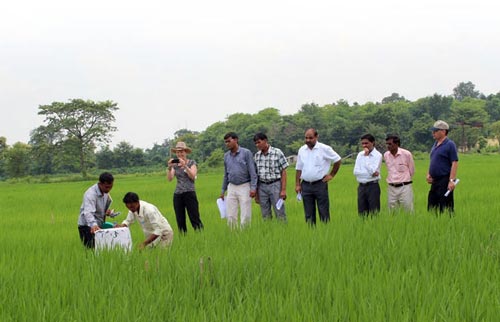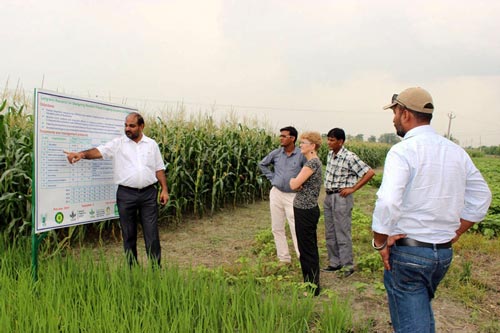By M.L. Jat/CIMMYT

Increased access to seeds better suited for local conditions and climate-smart crop management technologies are two strategies Bioversity International and CIMMYT India are using to improve the climate change resilience of resource-poor farmers. With the 14 August visit of Bioversity International Director General Ann Tutwiler to the Borlaug Institute for South Asia (BISA) Pusa site and the climate-smart villages in the Vaishali district of Bihar, this partnership has strengthened and will work to improve farmers’ coping and adaptation to climate change in eastern India. The groups are working under Climate Change, Agriculture and Food Security (CCAFS).
Agriculture is affected by variable temperatures and erratic climate events. Smallholder farmers who are impacted suffer from low production and increasing costs. Tutwiler said that CIMMYT, BISA and Bioversity have common interests and should complement each other’s work in making smallholder farmers climatesmart through local adaptation of stress-tolerant seeds and integrating them with better agronomic management. The greatest need is in multi-stakeholder partnerships and to apply collective wisdom to address these challenges for farmers’ benefits, she said.

Tutwiler and other visitors saw strategic research on conservation agriculture at the BISA farm as well as collaborative research between CIMMYT and the Indian Agricultural Research Institute (IARI). Participants discussed the long-term benefits of conservation agriculture, such as increased productivity, improved soil fertility, cost savings and reduction of greenhouse gas emissions. “At Pusa, we have established long-term research on conservation agriculture in predominant cropping systems to monitor and devise resilient future cropping systems and their component technologies for the eastern Indo Gangetic Plains,” said M.L. Jat, a CIMMYT senior cropping systems agronomist. “These work as capacity-building platforms for various stakeholders.”
The team also saw climate-smart technologies promoted by CIMMYT in collaboration with other CGIAR centers and national agricultural research and extension services under CCAFS. Mamta Kumari, a woman farmer from the climate-smart village Rajapakar said, “Rainfall has been unreliable for the last few years. Our crops and livelihoods are at risk with changing weather. But we are now getting more information about new seed, methods and technologies; we can see a change.” With access to timely information on weather, better-adapted seeds and improved crop management, women farmers are now feeling more empowered. “We are saving around 5,000 Rupees (about US$79) on the cost of production using zero tillage in wheat cultivation,” Kumari said. Tutwiler met and shared her experiences with CIMMYT Director General Thomas Lumpkin and discussed common goals of Bioversity, BISA and CIMMYT to improve lives of farmers under changing climate conditions
 Climate adaptation and mitigation
Climate adaptation and mitigation 
